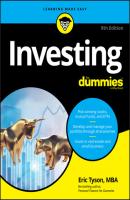Investing For Dummies. Eric Tyson
Чтение книги онлайн.

Читать онлайн книгу Investing For Dummies - Eric Tyson страница 33
Название: Investing For Dummies
Автор: Eric Tyson
Издательство: John Wiley & Sons Limited
Жанр: Личные финансы
isbn: 9781119716518
isbn:
One day, catastrophe struck: An explosion ripped through his building, and the ensuing fire destroyed virtually all the firm’s equipment and inventory, none of which was insured. The explosion also seriously injured several workers, including Manny, who didn’t carry disability insurance. Ultimately, Manny had to file for bankruptcy.
Here’s what you need in order to protect yourself and your assets:
Major medical health insurance: I’m not talking about one of those policies that pays $100 a day if you need to go into the hospital, or cancer insurance, or that $5,000 medical expense rider on your auto insurance policy. I know it’s unpleasant to consider, but you need a policy that pays for all types of major illnesses and major medical expenditures. The health insurance arena went through major changes due to the Affordable Care Act (Obamacare). See Chapter 14 for information on health insurance for small-business owners. Consider taking a health plan with a high deductible, which can minimize your premiums. Also, consider channeling extra money into a Health Savings Account (HSA), which provides tremendous tax breaks. As with a retirement account, contributions provide an upfront tax break, and money can grow over the years in an HSA without taxation. You can also tap HSA funds without penalty or taxation for a wide range of current health expenses.
Adequate liability insurance on your home and car to guard your assets against lawsuits: You should have at least enough liability insurance to protect your net worth (assets minus your liabilities/debts) or, ideally, twice your net worth. If you run your own business, get insurance for your business assets if they’re substantial, such as in Manny’s case. Also, consider professional liability insurance to protect against a lawsuit. You may also want to consider incorporating your business (which I discuss more in Chapter 14).
Long-term disability insurance: What would you (and your family) do to replace your income if a major disability prevented you from working? Even if you don’t have dependents, odds are that you are dependent on you. Most large employers offer group plans that have good benefits and are much less expensive than coverage you’d buy on your own. Also, check with your professional association for a competitive group plan.
Life insurance, if others are dependent on your income: If you’re single or your loved ones can live without your income, skip life insurance. If you need coverage, buy term insurance that, like your auto and home insurance, is pure insurance protection. The amount of term insurance you need to buy largely depends on how much of your income you want to replace.
Estate planning: At a minimum, most people need a simple will to delineate to whom they’d like to leave all their worldly possessions. If you hold significant assets outside retirement accounts, you may also benefit from establishing a living trust, which keeps your money from filtering through the hands of probate lawyers. Living wills and medical powers of attorney are useful to have in case you’re ever in a medically incapacitated situation. If you have substantial assets, doing more involved estate planning is wise to minimize estate taxes and ensure the orderly passing of your assets to your heirs.
In my experience as a financial counselor, I’ve seen that although many people lack particular types of insurance, others possess unnecessary policies. Many people also keep very low deductibles. Remember to insure against potential losses that would be financially catastrophic for you — don’t waste your money to protect against smaller losses. (See the latest edition of my book Personal Finance For Dummies, published by Wiley, to discover the right and wrong ways to buy insurance, what to look for in policies, and where to get good policies.)
Part 2
Stocks, Bonds, and Wall Street
IN THIS PART …
Understand the marketplace of stocks and bonds and make diversified investments according to your chosen level of risk.
Master building wealth with stocks through stock mutual funds, exchange-traded funds, and individual stocks.
Explore lending investments, particularly bonds and funds, and find out how best to allocate your assets.
Comprehend the money pros’ mind-numbing jargon so you can shop for brokerage services with confidence.
Конец ознакомительного фрагмента.
Текст предоставлен ООО «ЛитРес».
Прочитайте эту книгу целиком, купив полную легальную версию на ЛитРес.
Безопасно оплатить книгу можно банковской картой Visa, MasterCard, Maestro, со счета мобильного телефона, с платежного терминала, в салоне МТС или Связной, через PayPal, WebMoney, Яндекс.Деньги, QIWI Кошелек, бонусными картами или другим удобным Вам способом.